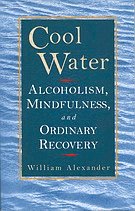Cool Water: Alcoholism, Mindfulness and Ordinary Recovery

Update from the Publisher:
Shambhala has re-published a newer edition of this book, under the title “Ordinary Recovery: Mindfulness, Addiction, and the Path of Lifelong Sobriety”.
You can find a link to it here.
Chapter headings:
- Introduction: something’s happening here
- Breakdown, ordinary recovery and autumn prayers
- Coming home
- Off the cushion and out the door
- My liver, my mind, my self
- Mindfulness
- Psychedelic cheeseburgers and shimmering pines
- Making stew
- Stepping off the hundred-foot pole
- Breathing room
- Rage at the Short Hills Mall
- How to build a cathedral
- Breathing room
- Rapture
- God’s will
…And the power to carry that out - Blood in the steel
- I may not be much, but I’m all I ever think about
- Breathing room
- Keep coming back
- How to wash dishes
- Already broken
- Lenny and the three stooges
- Breathing room
- Get (it) together
- Breathing room
- The healing Buddha
- Afterword
- Suggested reading
Selected excerpts:
“After a few years of recovery, I returned to my longtime affection for the teachings of Zen Buddhism. Over time I began to see how beautifully those teachings dovetailed with the practice of the Twelve Steps of Alcoholics Anonymous. For me, Zen practice amplified and extended what I had begun to find in AA. I saw that recovery from addiction was a gift and that the gift was revealed to me in the ordinary stuff of daily life. So ordinary, this extraordinary gift.” (p. 7)
“Practicing Buddhists “take refuge” daily in what are known as the Three Jewels. I understand this as a way of expressing humility and of acknowledging a connection to powers “greater than myself” or to the power of things as they are. This is not a metaphor. It is an expression of the truth.”
“In some traditions this connection is expressed by three bows, often repeated many times. In others, there is a combination of bows and chanting. In the Order of Interbeing, the connection is expressed through a chant that is part of daily liturgical practice, either at home or in a group. Here is that chant.”
“I take refuge in the Buddha, the one who shows me the way in this life. Namo Buddhaya.
I take refuge in the Dharma, the way of understanding and love. Namo Dharmaya.
I take refuge in the Sangha, the community that lives in harmony and awareness. Namo Sanghaya.”
“I consider the Buddha here to be that greater self that I am an expression of when I am living fully in the moment and in consonance with the Twelve Steps and my Buddhist vows. It is the Twelve Steps and the vows that, in this context, are the dharma, while the sangha is my own chosen community.” (p. 127)
© 1997 William Alexander
Order this book online at Amazon
Reviews posted:
Paul –
This is a short, elegant book of reflections on Zen Buddhism and AA. I enjoyed his suggestions for refreshing mindfulness on a daily basis (like ‘How to Cook Brown Rice’ or ‘How to Wash Dishes’). I was also very grateful for his critiques of certain AA issues that I’ve always had a problem with, which he presents with empathy and understanding. Like listening to shakuhachi flute on a Sunday morning, there is something very relaxed and civilised about this book. Alexander is a proponent of ‘Ordinary Recovery’, which seeks to introduce Buddhist principles in dealing with long term freedom from addiction. His short chapter on transience entitled ‘Already Broken’ (with apologies and thanks to Mark Epstein and Achaan Chaa) is one that will stay with me forever.
Michael –
William Alexander provides a series of short but potent reflections on his own personal experience with Zen Buddhism and AA. Though I found this book challenged a few areas of popular AA thinking, it nonetheless was with an understanding that comes from years of personal experience and with utmost respect for much of what Twelve Step recovery can offer. Shining the light of Zen questioning onto certain aspects of popular recovery thinking I see as ultimately helpful, if for no other reason than it represents the Zen practice of challenging ourselves and seeing through some of our own conditioning and strongly held views. But the author ultimately provides more than enough insight, practice and answers here as well. His mention of a meeting format that introduces the respectful silence of the meditation hall to AA style sharing was the inspiration for a similar group I have started.
